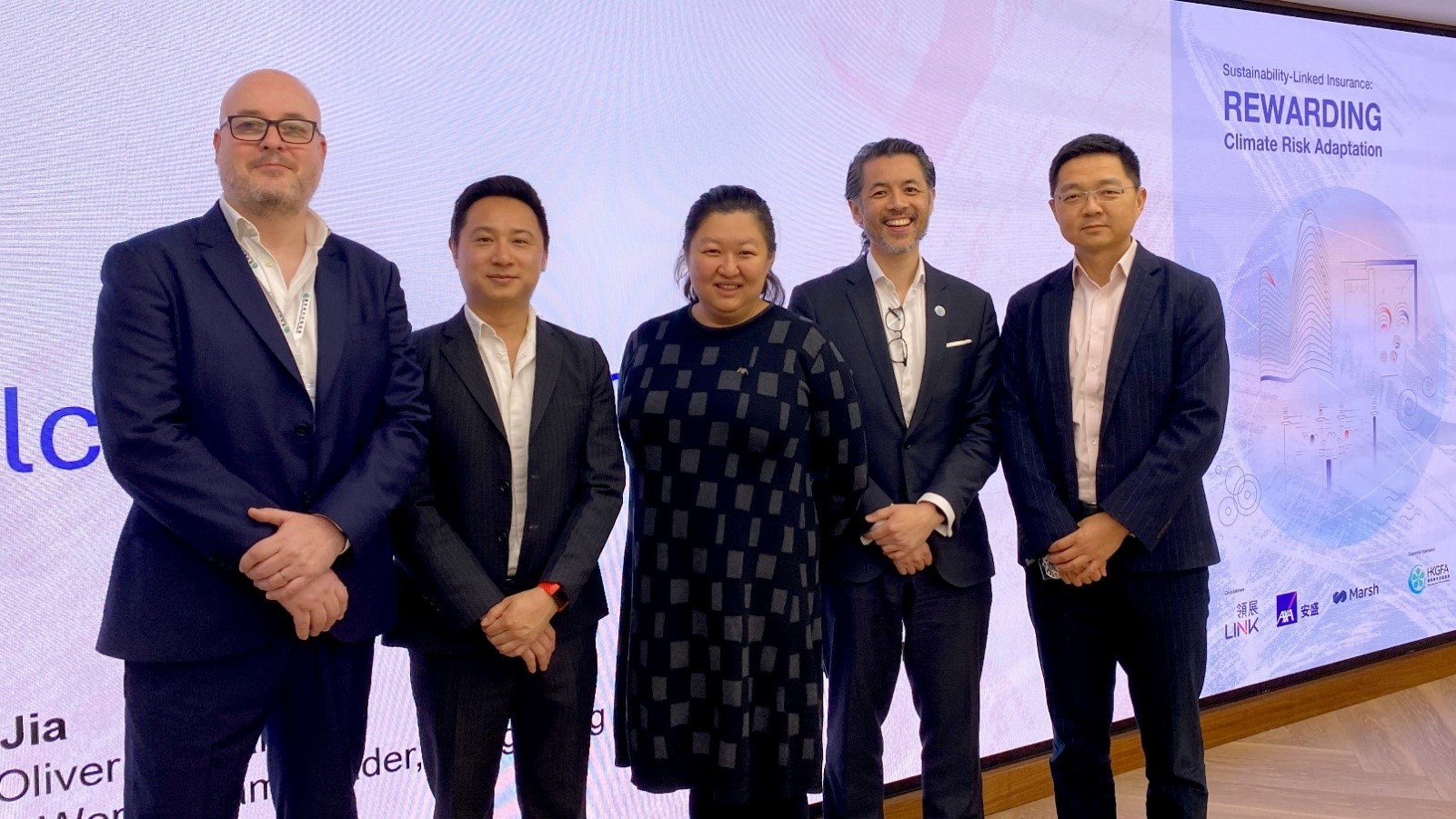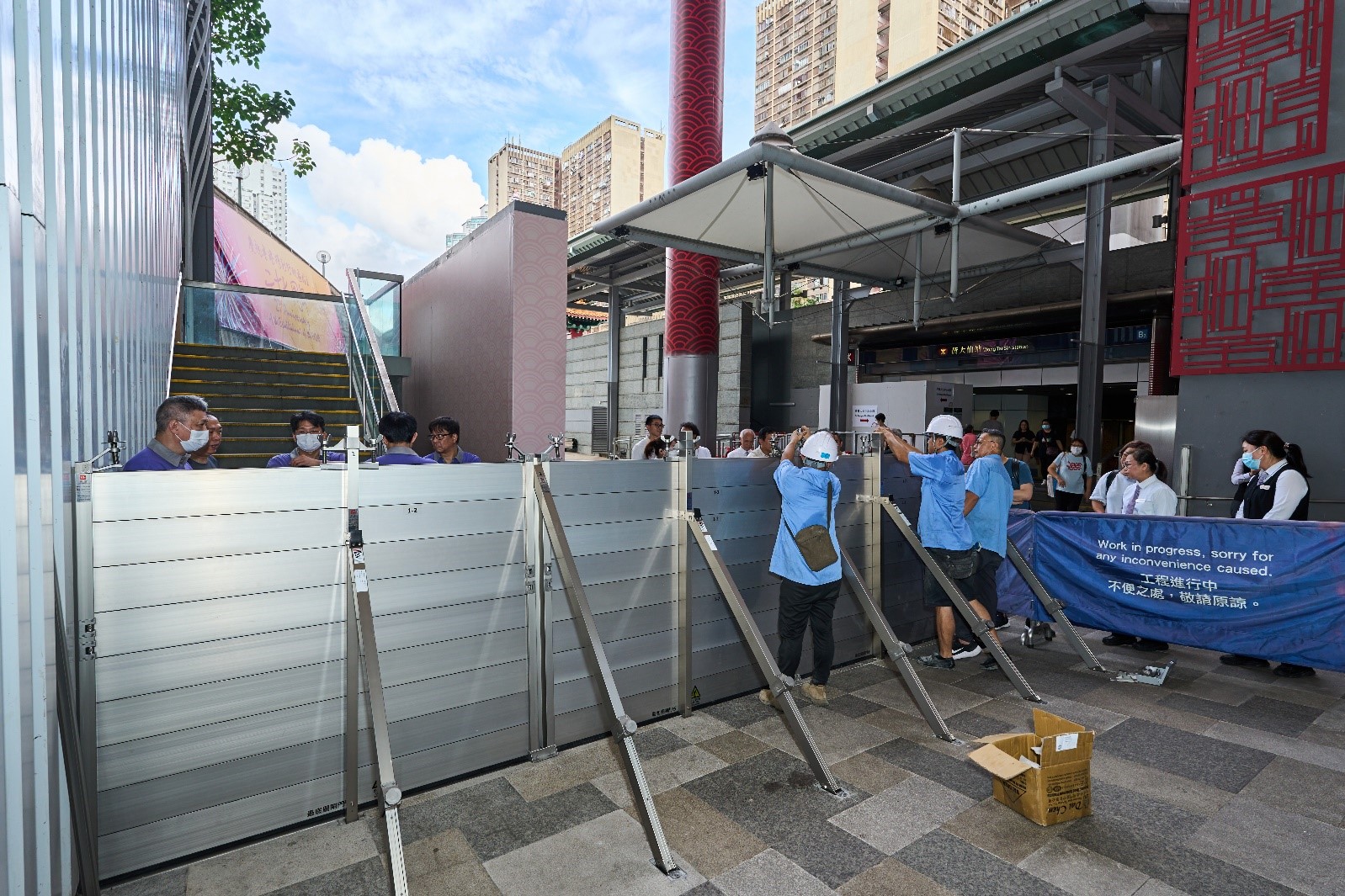2025-05-14
Link Asset Management Co-published the Sustainability-Linked Insurance: Rewarding Climate Risk Adaptation White Paper with AXA Hong Kong & Macau and Marsh
From Super Typhoon Mangkhut in 2018 to the record-breaking Black Rainstorms in 2023, Hong Kong has faced increasingly severe extreme weather events, driving up insured losses and testing the resilience of all industries. In response, insurers globally have raised premiums and tightened terms, creating a vicious cycle of escalating costs and potential uninsurable assets. Traditionally, the real estate industry has viewed insurance as a necessary cost of doing business - a safeguard against unforeseen risks, but rarely a tool for creating value.
However, that paradigm is shifting.
Link Asset Management (Link) has explored how real estate climate resilience efforts can be linked with insurance terms - a model that doesn’t just provide protection but actively rewards investment in climate adaptation measures. To emphasise this transformative approach, Link partnered with AXA Hong Kong & Macau (AXA) and Marsh, with support from the Hong Kong Green Finance Association, to launch a white paper titled Sustainability-Linked Insurance: Rewarding Climate Risk Adaptation. This report showcases how a proactive stance on climate resilience can unlock significant financial rewards for real estate companies, encouraging a shift in industry standards.
Link’s Resilience Framework, consisting of six interconnected pillars, underpins the Company’s comprehensive climate risk strategies. Since 2019, Link have conducted in-depth climate risk assessments to identify vulnerabilities within its portfolio, particularly related to flooding and typhoon threats. The Company assessed and enhanced its mitigation measures by implementing innovative solutions such as detachable flood barriers and IoT flood sensors in its properties. Additionally, the Company established standardised emergency protocols and prioritised preventive maintenance for drainage systems, ensuring effective responses to extreme weather events and minimising disruptions to its tenants' operations.
Through careful quantification of climate risk and targeted resilience investments, Link, with the help of its insurance broker Marsh Hong Kong, secured an 11.7% reduction in property insurance premiums in 2025 compared to 2024 - significantly outperforming the industry’s ~3% average reduction. Even more importantly, Link negotiated an additional 7.5% premium reduction tied to its loss ratio, creating a direct financial incentive to continue investing in long-term climate preparedness.
By embedding climate resilience into its operational and financial strategy, Link has proven that climate adaptation isn’t just a defensive measure — it’s a value creator. Rising climate risks will continue to challenge traditional insurance models, but Link’s resilience-linked insurance structure offers a replicable blueprint for other asset owners. Explore Link’s insights further in Sustainability-Linked Insurance: Rewarding Climate Risk Adaptation.
However, that paradigm is shifting.
Link Asset Management (Link) has explored how real estate climate resilience efforts can be linked with insurance terms - a model that doesn’t just provide protection but actively rewards investment in climate adaptation measures. To emphasise this transformative approach, Link partnered with AXA Hong Kong & Macau (AXA) and Marsh, with support from the Hong Kong Green Finance Association, to launch a white paper titled Sustainability-Linked Insurance: Rewarding Climate Risk Adaptation. This report showcases how a proactive stance on climate resilience can unlock significant financial rewards for real estate companies, encouraging a shift in industry standards.
Link’s Resilience Framework, consisting of six interconnected pillars, underpins the Company’s comprehensive climate risk strategies. Since 2019, Link have conducted in-depth climate risk assessments to identify vulnerabilities within its portfolio, particularly related to flooding and typhoon threats. The Company assessed and enhanced its mitigation measures by implementing innovative solutions such as detachable flood barriers and IoT flood sensors in its properties. Additionally, the Company established standardised emergency protocols and prioritised preventive maintenance for drainage systems, ensuring effective responses to extreme weather events and minimising disruptions to its tenants' operations.
Through careful quantification of climate risk and targeted resilience investments, Link, with the help of its insurance broker Marsh Hong Kong, secured an 11.7% reduction in property insurance premiums in 2025 compared to 2024 - significantly outperforming the industry’s ~3% average reduction. Even more importantly, Link negotiated an additional 7.5% premium reduction tied to its loss ratio, creating a direct financial incentive to continue investing in long-term climate preparedness.
By embedding climate resilience into its operational and financial strategy, Link has proven that climate adaptation isn’t just a defensive measure — it’s a value creator. Rising climate risks will continue to challenge traditional insurance models, but Link’s resilience-linked insurance structure offers a replicable blueprint for other asset owners. Explore Link’s insights further in Sustainability-Linked Insurance: Rewarding Climate Risk Adaptation.

Mr Edward FARRELLY, Senior Vice President and Real Estate Industry Leader at Marsh Asia (left); Mr Calvin Lee KWAN, Managing Director - Sustainability and Risk Governance at Link (second from left); Ms Chelsea JIANG, Chief Technical & Innovation Officer, General Insurance, AXA Greater China (third from left); Mr Tsun CHEN, Secretary General, Hong Kong Green Finance Association (second from right); and Mr Jingwei JIA - Insurance Workstream Lead, Hong Kong Green Finance Association (right), share insights on scaling Sustainability-Linked Insurance into a broader, viable product at a workshop in Hong Kong.

Temple Mall North’s LG floor, which suffered severe flooding during the black rainstorm alert in September 2023, was restored in 54 days after flooding.

Detachable Flood Barriers